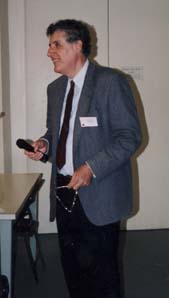

Stanley Brodsky was chairman of the afternoon session
and also
served on the organizing committee.
Speaker: Pief Panofsky (SLAC)
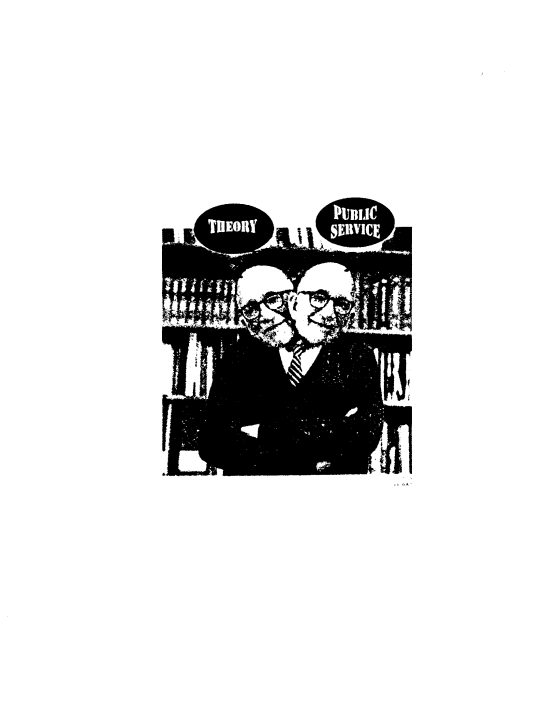
The audience erupted with laughter when Panofsky showed a positive
benefit of radiation: a two-headed Drell, one head in theory,
the other in public service. "Sid always chooses topics that are
controversial," said Panofsky. "The government needs independent
experts, and we are fortunate that Sid is both."
Speaker: Joan Rohlfing (DOE)
In 1983, Joan Rohlfing was an undergraduate at the University of Illinois when she was asked to interview a visiting scholar for the local radio station. Little did she know that her future in nuclear nonproliferation was about to begin. She said Drell insisted that "we can make progress if we continue a good faith effort to deal with the Russians." Not knowing at that time what was even meant by "good faith," Rohlfing then went on to detail the progress that has been made by taking the Drell path.
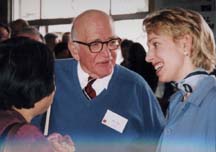
Everyone seemed to have lots of fun at the Drell Fest. Here Sid shares a joke with Joan Rohlfing (to right) from the DOE. Joan spoke about Sid's role at the national level in nuclear nonproliferation.
Speaker: Ted Postol (MIT)
Postol gave a chilling account of a "false alert" in January 1995 when a rocket was launched in Norway. It was detected by Russian radar and appeared to be on a trajectory from Grand Forks, North Dakota. This could have triggered a nuclear response. He then went on to discuss outdated Russian systems and concluded that it is in the US interests to give to the Russians the details of our 30-year-old technology for infrared satellite detection of missile launches, in order to prevent future accidents or misinterpretation of radar data.
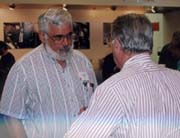
Ted Postol, who spoke on weaknesses in the Russian missile detection systems, in serious conversation with a colleague on national defense topics.
Speaker: Richard Garwin (IBM)
"The National Security Council owes Drell a great debt of gratitude," said Garwin, after listing the many roles that Drell has played behind the scenes in various administrations. Drell and Garwin were both on an advisory board to Henry Kissinger during the Nixon administration. "Sid's involvement with national security is so broad and so deep that it would take an entire day of talks such as this to begin the story," said Garwin. But if you were to ask Drell about it, he would say, "If I knew, I couldn't tell you anyway."
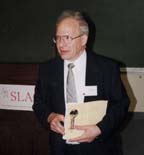
Richard Garwin (IBM) spoke on the role that Sid Drell played in national
security and in so doing, told us a bit about his own very important
role in the same arena.
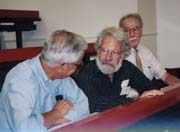
The DOE's Marty Molloy (far right) found it better to listen as SLAC sages Ed Garwin (center) and Dave Coward (left) argued the fine points of the inelastic sum rules, or maybe it was about brother Richard Garwin's presentation.
Speaker: Martha Krebs (DOE)
Krebs gave both a personal and professional summary of Drell and the DOE. "The words that have been repeated today are 'values, good faith, hope, vision, and judgement,' as applying to Sid." In reflecting on those words, Krebs acknowledged Drell's contributions to the Department.
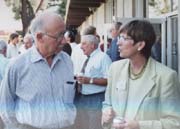
Matt Allen is seen here chatting with Martha Krebs, who spoke
about Drell's role in the DOE.
Speaker: Burton Richter (SLAC)
"It's rare that I have the last word in discussion with Sid," said Burton Richter and he used the opportunity to tell a few tales which were not widely known. First, Drell was on Richter's PhD orals committee and known for asking hard questions. Fortunately, Drell and the committee chair got into a debate, which took up 20 minutes of the allotted two hours, so Richter had fewer questions to answer.
Richter talked about the Theory Group and the fact that of the 120 PhD theorists who came through SLAC, 70 are now in responsible positions around the world, either as faculty, department chairs, leaders of divisions or laboratories. Quite a score card. "Drell has been Deputy Director of SLAC for 28 years," said Richter, "but his skill is not administration." Drell is good with people because they trust him, and they trust him because he is incorruptible, said Richter. "I value his wise counsel."
Drell didn't plan on giving any remarks at the symposium, but he offered three statements: he was "honored to see so many theorists come back to SLAC today," he was delighted with the quality of the content of the talks, and very grateful to Michael Peskin and his committee for all their hard work in planning today's event.